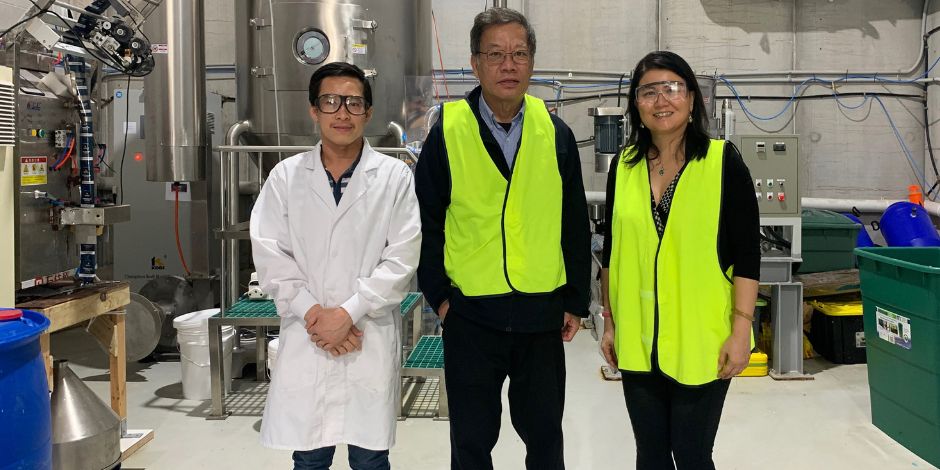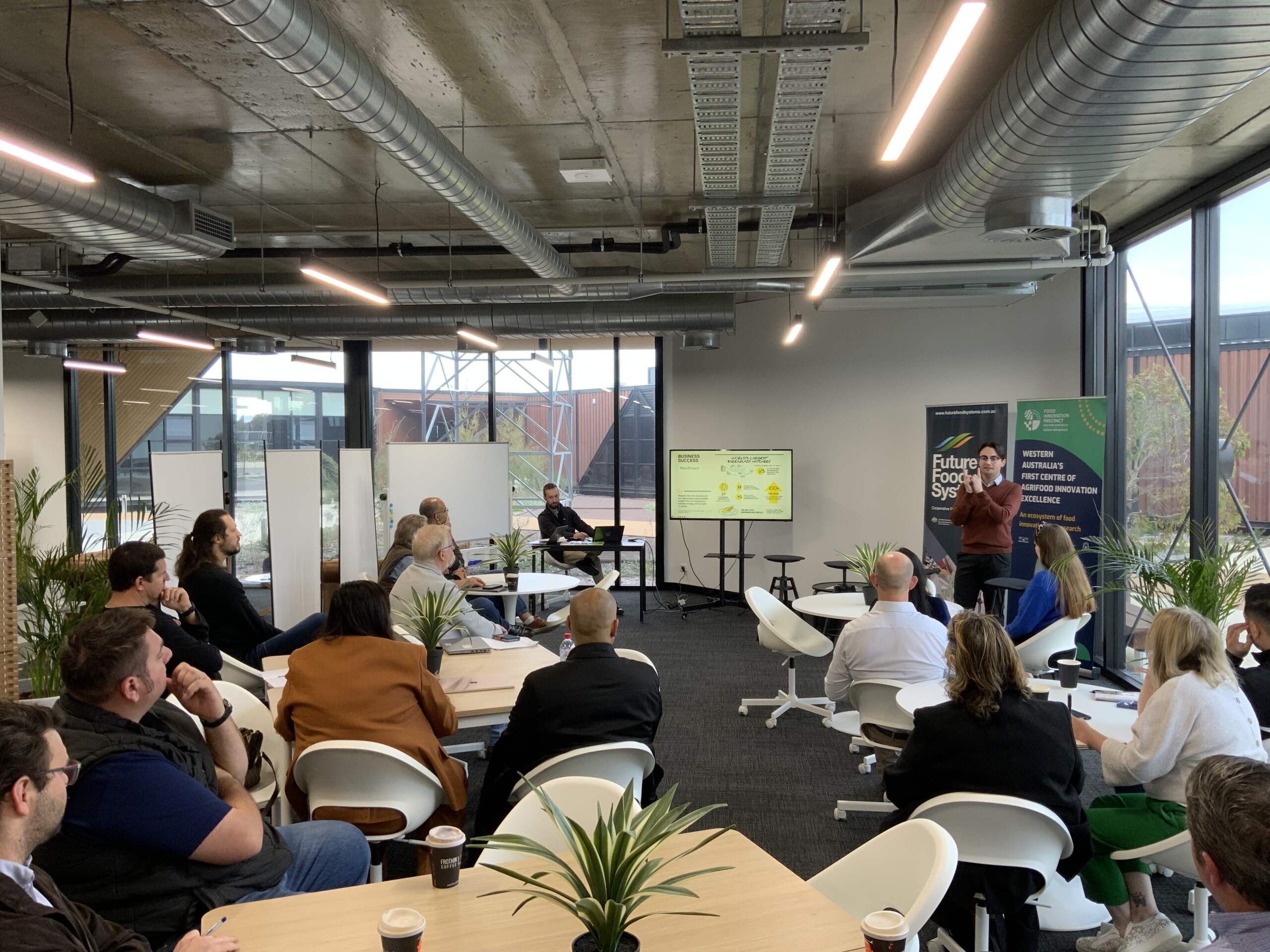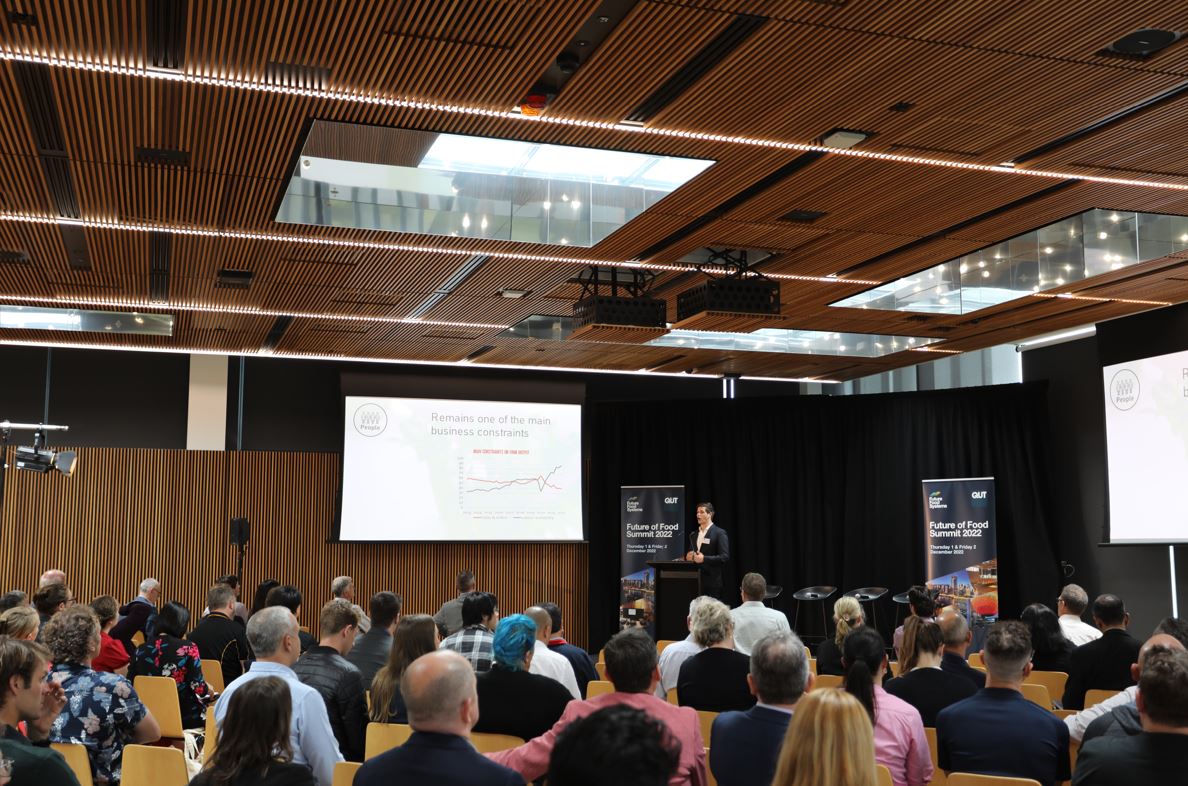How collaborative ecosystems are driving innovation in agrifood
Take cutting-edge agrifood technology, build lasting collaboration to drive further innovation, test at scale and value-add – creating benefits not just for one business but an entire community. It’s an approach to innovation that gives the work of the Future Food Systems CRC an ‘exceptional edge’ and one the CRC is keen to showcase at evokeAG. 2024.
 Van-Tri Luong (EcoMag), Dr Tam Tran (EcoMag’s Chief Technology Officer) and Professor Cordelia Selomulya (Future Food Systems - Research and Commercialisation Director) with EcoMag’s spray dryer, capable of producing 10 kilograms per day of high-grade Mg organics in powder form.
Van-Tri Luong (EcoMag), Dr Tam Tran (EcoMag’s Chief Technology Officer) and Professor Cordelia Selomulya (Future Food Systems - Research and Commercialisation Director) with EcoMag’s spray dryer, capable of producing 10 kilograms per day of high-grade Mg organics in powder form.
The Future Food Systems Cooperative Research Centre (CRC), an evokeAG. 2024 partner, focuses on collaborative innovation ecosystems to create new agricultural methods and food technologies. The goal? Value add to Australia’s primary produce and shore up food security.
Chief Executive Officer Dr James Krahe said good collaboration is about much more than getting people in the same room.
“It’s about understanding why people take the next level of cooperation, what drives them and what makes those relationships successful, and synergistic, rather than just transactional,” he said.
“A clustering ecosystem approach allows technologies and research to be tested at a scale that’s bigger than one or two businesses, by connecting with communities and supply chains within a geographical location – sometimes even those outside of food and agriculture.”
RELATED: Industry heavyweights line up for evokeAG. 2024

Dr James Krahe hosting a workshop at the Food Innovation Precinct Western Australia (FIPWA) WA agrifood stakeholders.
Collaboration in the Pilbara
Dr Krahe points to innovation being driven by collaboration in Western Australia’s Pilbara region.
Australian chemical company, EcoMag Ltd has been working with Future Food Systems since 2020 in developing technologies and applications for the extraction of high-purity magnesium (Mg) based particles, sourced from the waste bitterns of solar salt operations in Karratha.
The EcoMag spray drying project, through the CRC and working with chemical engineers at the University of New South Wales, has found a better way to produce Mg particles. It allows for production to be scaled-up for high-value applications such as health supplements, food and pharmaceuticals.
But Dr Krahe said the second phase of the project is creating an ecosystem that has potential for much broader impact.
“That business is moving to capitalise on the technology where the raw material is available,” he said.
“In doing so, they created a circular economy because they’re extracting the magnesium from the water stream, which is then cleaning up that water stream, and that water stream is then being used by the local community to grow additional crops.
“In Karratha there’s not a whole lot of fresh produce being produced but now that there is water suitable for horticulture crops, the community is starting to have secondary businesses.”

The 2022 edition of the Future Food Systems Summit.
More research aims to ‘upcycle’ the Mg, along with agri-waste such as straw and wood, and CO2 released as a by-product of industrial operations – into low-carbon plasterboard for the construction industry.
The creation of a Magnesium Business Park near Karratha is expected to drive further innovation and foster development of downstream mineral processing in the region.
RELATED: Foundations laid for manufacturing CE construction materials
Working together to reduce cost and risk of innovation
Collaboration is also unlocking opportunities for Western Australia’s agrifood sector at the Food Technology Facility.
A $12.2m election commitment of the WA Government in collaboration with the Future Food Systems, the WA Department of Primary Industries and Regional Development and Murdoch University, the food manufacturing pilot plant will help food companies to develop and test innovations.
Dr Krahe said the advanced manufacturing technology can be game-changing for industry looking to value-add.
“The facility has a practical, commercial focus that will allow agrifood businesses to trial new products at batch-scale without the costly investment in plant or equipment,” he said.
“We believe there’s much to be gained in bringing small to medium enterprises, entrepreneurs and researchers together with multiple layers of government.”
RELATED: Accelerating transformation to achieve a more sustainable global food system
Take a sneak peek
Keen to tour the state-of-the-art facility the Food Technology System, during Future Food Systems’ For Food’s Sake Summit? It will be held after evokeAG. 2024 on Thursday 22 February and Friday 23 February.
“The Summit will take people on a journey through cutting-edge research and the latest industry trends, with inspiring stories from people across the food sector,” Dr Krahe said.

The best of Western Australia’s produce will be on show at the Summit’s Gala Dinner at the premium steakhouse 6HEAD at Elizabeth Quay on Thursday evening as head chef Shane Middleton takes diners on a culinary adventure.
Head to Boola Katijin Murdoch University on Thursday 22 February where the Summit will feature thought-provoking discussions about sustainability and food security, AI automation and crop monitoring, value-adding, and what type of food we can expect on our plate in 2050.
“Rather than just looking at innovation in isolation, the Summit will explore how innovation within systems can drive further innovation and benefit all players within the chain,” Dr Krahe said.
The best of Western Australia’s produce will be on show at the Summit’s Gala Dinner at the premium steakhouse 6HEAD at Elizabeth Quay on Thursday evening.
Delegates will also see how collaboration is delivering real world impact through a series of tours on Friday 23 February, including the official opening of the Food Technology Facility at the Food Innovation Precinct Western Australia (FIPWA), in the Peel Business Park near Mandurah.
Learn more about the work of Future Foods Systems and meet the team at the Asia Pacific’s premier agrifood event, evokeAG. 2024 in Perth from Tuesday 20 February to Wednesday 21 February. Tickets are on sale now.
Make the most of your time in Perth, be inspired by the game-changing innovations in food and book your tickets to the For Food’s Sake Summit.
